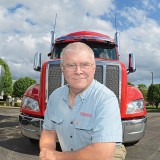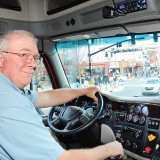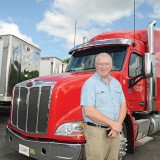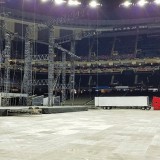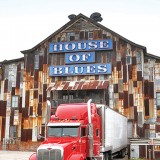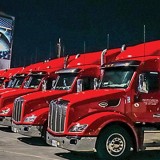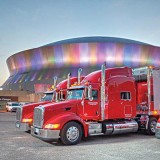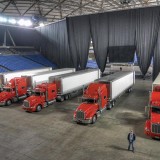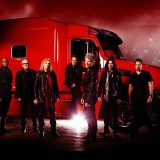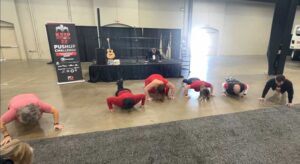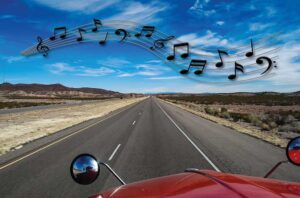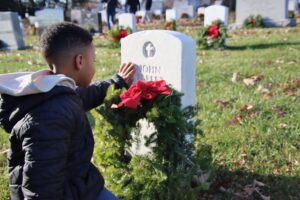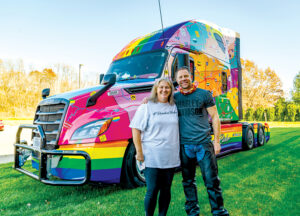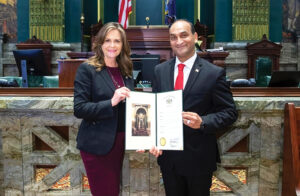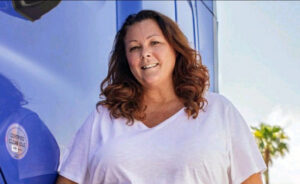You’ve got your tickets in hand, a smile on your face and a sense of eagerness as you wait for the concert to start. Ever since you bought those tickets, you’ve been anticipating this night — the night you see your favorite band, or maybe your friend’s favorite band. Either way, you know this night is going to be fun.
The stage is already set up when you arrive, but that’s not what you’re thinking about. All your thoughts are on the imminent appearance of the artist.
Then, the music begins to play, and the show begins. All is well.
Your view of a concert is much different than those who put it on, especially truck drivers.
As a fleet safety manager and driver for Upstaging Inc., a company that transports stage lighting, sound, video, set, wardrobe, band gear and other production-related equipment for touring artists, Chip Warterfield is focused solely on the stage.
“There is an art to moving a show,” he said. “If you’ve seen a touring schedule where the artist is in a different town every day for four or five days a week, then there’s a pace to it all, to how that gets done. The wheels underneath the show are the trucks and buses that move around. You don’t get to just pull over; you have to keep this thing moving.”
Warterfield didn’t learn all of this in one show. He has 41 years’ worth of experience hauling band gear and lighting.
“It’s like one 41-year-long weekend,” he said.
Just like the artists on tour, it’s a fast-paced life for Warterfield, and he loves every minute of it.
He didn’t start out hauling for some of the most well-known bands and artists. It actually all started with something completely different — boats.
“I started out in this business totally by accident, ‘guilty by association,’ you might say,” he said. “I was always interested in all things transportation.”
An interest in the actual trucking industry did not hit him until a while later. He was already working in a form of transportation — hauling boats from coast to coast in his pickup truck — and he had enrolled in a vocational program to become a screen printer.
Warterfield recalled that screen printing and graphics were the first notable businesses to come to his hometown of Nashville, Tennessee, and thought it would be a solid career to go into.
His first gig in the screen-printing world gave way to his first encounter with the music industry when he was tasked with hauling T-shirts to a music club in Fort Worth, Texas.
“I saw the energy and excitement and I was like, ‘Man, I gotta have a part of this,’” he said. “Then I never looked back.”
Growing up in “Music City,” it wasn’t uncommon to go to school with friends whose parents were in the music business.
“It just kind of became second nature to fall into some work working around the artists,” he explained, adding that one of his friend’s parents, who was an artist manager, connected him with the iconic Southern rock band, Alabama.
Warterfield drove Alabama’s buses for seven years before he started driving tractor-trailers for the band. All in all, Warterfield drove for the band for 13 years.
Even when Alabama wasn’t on tour, the show went on for Warterfield; he filled his time by working with other artists, including Ricky van Shelton and Reba McEntire.
“The whole game of entertainment transportation changed a lot during those years, but it’s been an interesting vision, watching it go from where a person worked directly for an artist to where you worked for one of the vendors to the artists,” he said.
Today, Warterfield works for Upstaging, which hauls the touring production for artists like Metallica, Rolling Stones, Foo Fighters, Beyonce and Coldplay.
Of course, with a job hauling for some of the most notable artists and performers in the music industry, many readers are likely wondering: Do the drivers ever meet the artists while driving for these vendors?
Warterfield quickly noted that “meeting artists is not a part of our job,” adding that occasionally “by association, the artists might get to see us.”
Even though Upstaging drivers don’t work directly with the artists, there is always a chance of encountering members of the artist’s team. Warterfield shared that a backing vocalist for Colbie Caillat once borrowed his iPod.
“She brought it back and (said) I needed to be committed for the wide variety of music that was on my iPod,” he said with a laugh.
Warterfield doesn’t always get to choose which bands or performers he drives for, but a perk of the job is, of course, getting to haul equipment for artists he loves.
“I tend to like Americana and country music,” he said. “Being born and raised in Nashville, you’re just familiar with it all there is. I firmly believe all the best music was recorded in the ’70s and ’80s, but that’s just me being an old guy.”
One might think that being a truck driver for the entertainment industry would guarantee a front-row seat to lots of concerts, but Warterfield said hauling for a tour is almost always “just business.” Instead of attending the shows, drivers are typically resting in preparation for the next day’s drive or assignment. Occasionally, though, he might be able to see a show — if time allows.
Warterfield said one of his favorite assignments is hauling for country artist Kenny Chesney.
“The tours are always great,” he said. “He does huge stadium shows, with always a special guest showing up on the weekends, and he would bring some of the most amazing figures of rock ’n’ roll to come in.”
Despite the rock ’n’ roll moments that occasionally come with the territory, Warterfield said his favorite part is the camaraderie among his co-workers.
“The most interesting people that you cross paths with are all the crews,” he said. “They have some amazing background stories.”
His co-workers are also his real-life friends.
“One of the things we do when we’re out on tour that gets to be pretty interesting is when we do have extra time off, we’ll throw together something of what you might call a potluck,” he said. “We’ll bust out the grill and all kinds of stuff, and just set up camp and start to fix ourselves a great big old feast. So, the camaraderie is the best part of it all.”
Warterfield’s line of work might seem like glitz and glam, but there’s no question that it is hard work. He’s a part of a team of carefully selected drivers, chosen because of their reputation for reliability.
If that standard isn’t met, a concert could be delayed — and the show must go on.
“This is completely different than hauling regular freight, (where) you usually pick up a load and take it from one place to another,” said Robin Shaw, who is a leader with Upstaging.
Shaw added that Upstaging avoids using titles for their employees in order to promote a company culture of inclusion, which demonstrates that “everyone who works there is equally important.”
Upstaging is a prominent company in entertainment transport and is also a heavy hitter in concert lighting, supplying everything from lights to video, set and the crew needed to support the show, Shaw noted.
Hauling the nuts and bolts for a concert or performance can be a lot of pressure, but Warterfield enjoys it.
“If you get into this and identify with it, the pace of the work is fantastic,” he said. “We just don’t run that many miles. We work well as a team, and we get a lot of really amazing moves done. There’s a great sense of accomplishment with it, and the reward is good.”
Shaw said a lot of Upstaging drivers get a sense of accomplishment and pride within a trucking entertainment role, because they are a part of a whole team that helps to make a show possible.
Shaw said driving for Upstaging differs from other trucking jobs, because drivers take on responsibility as part of a crew who put on these shows.
“There is a great sense of satisfaction and pride in this job,” Shaw said. “You bring a lot of joy to the folks that come to see the show.”
The drivers behind each concert are essential pieces of creating a positive experience for the audience. In a way, each concertgoer’s memory of the event — just like retail items such as T-shirts and toilet paper — was transported on a truck.
“All in all, I’m right at home with what we do here,” Warterfield said. “It’s difficult. It’s not for everyone, but for those that are ready for a unique change in the ways you can truck, this is certainly a good place to be and experience something different.”
Hannah Butler is a lover of interesting people, places, photos and the written word. Butler is a former community newspaper reporter and editor for Arkansas Tech University’s student newspaper. Butler is currently finishing up her undergraduate print journalism degree and hopes to pursue higher education. Her work has been featured in at least nine different publications.









